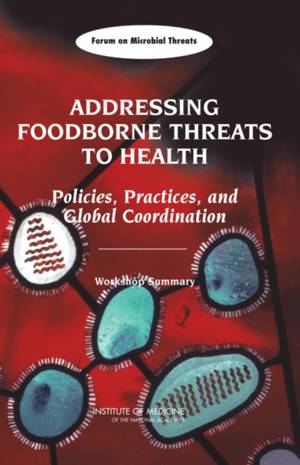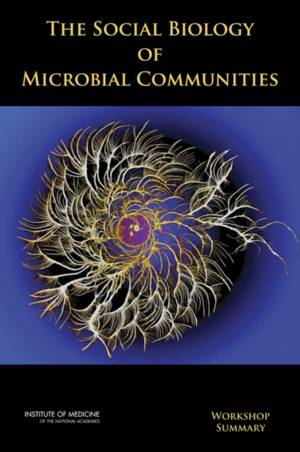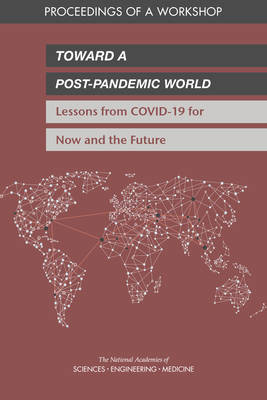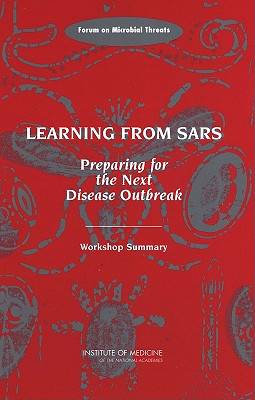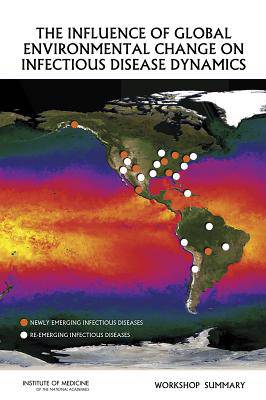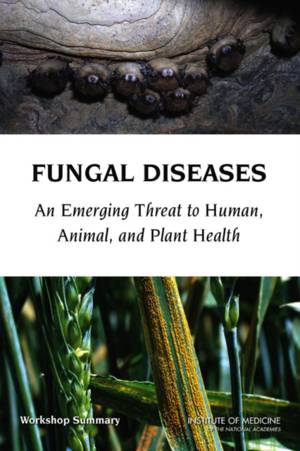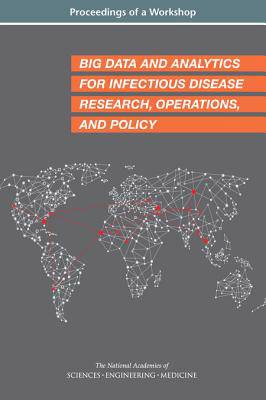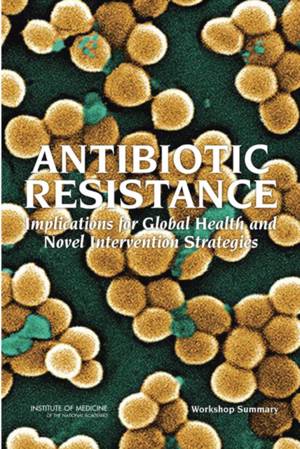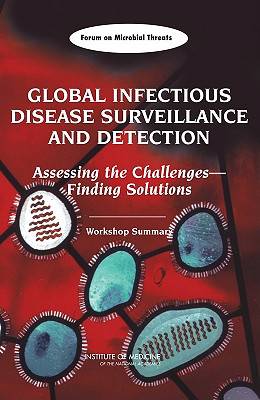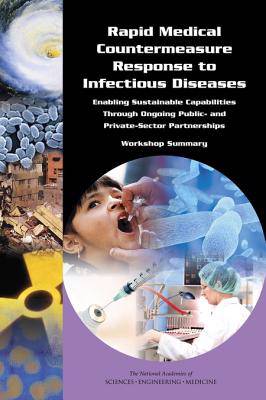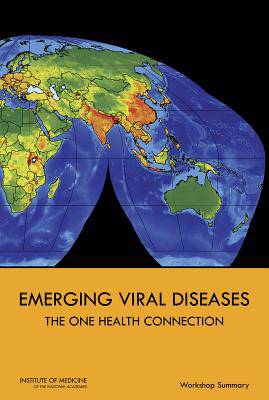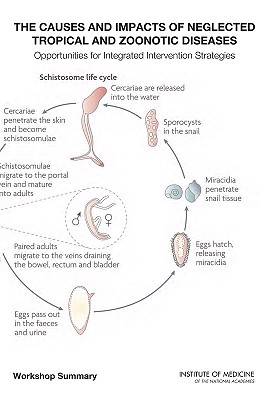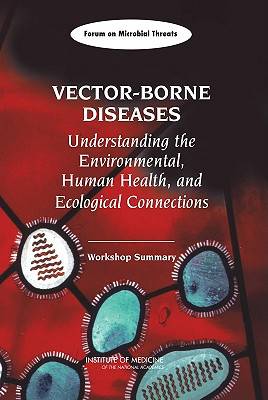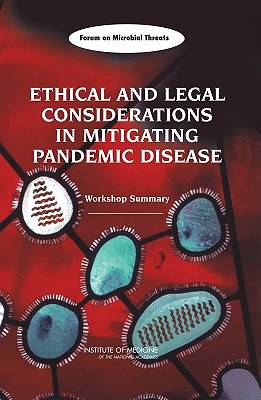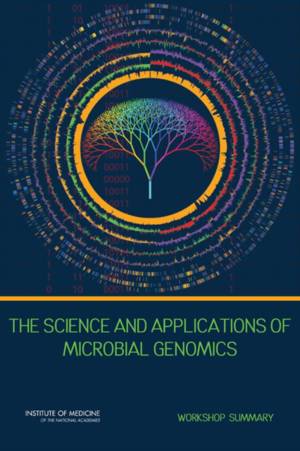
- Afhalen na 1 uur in een winkel met voorraad
- Gratis thuislevering in België vanaf € 30
- Ruim aanbod met 7 miljoen producten
- Afhalen na 1 uur in een winkel met voorraad
- Gratis thuislevering in België vanaf € 30
- Ruim aanbod met 7 miljoen producten
Zoeken
Resultaten voor "Forum on Microbial Threats"
-
Improving Food Safety Through a One Health Approach
Institute of Medicine, Board on Global Health, Forum on Microbial Threats
- Paperback | Engels
- Globalization of the food supply has created conditions favorable for the emergence, reemergence, and spread of food-borne pathogens-compounding the c... Lees meer
€ 85,45Levertermijn 1 à 4 weken€ 85,45Levertermijn 1 à 4 weken -
Addressing Foodborne Threats to Health
Institute of Medicine, Board on Global Health, Forum on Microbial Threats
- Paperback | Engels
- In December 2004, at a press conference called to announce his departure as Secretary of the Department of Health and Human Services (HHS), Tommy Thom... Lees meer
€ 96,45Levering 1 à 2 weken€ 96,45Levering 1 à 2 weken -
Global Health Risk Framework
National Academies of Sciences Engineering and Medicine, Institute of Medicine, Board on Global Health, Forum on Microbial Threats
- Paperback | Engels
- Since the 2014 Ebola outbreak many public- and private-sector leaders have seen a need for improved management of global public health emergencies. Th... Lees meer
€ 51,95Levering 1 à 2 weken€ 51,95Levering 1 à 2 weken -
The Social Biology of Microbial Communities
Institute of Medicine, Board on Global Health, Forum on Microbial Threats
- Paperback | Engels
- Beginning with the germ theory of disease in the 19th century and extending through most of the 20th century, microbes were believed to live their liv... Lees meer
€ 85,45Levertermijn 1 à 4 weken€ 85,45Levertermijn 1 à 4 weken -
Exploring Lessons Learned from a Century of Outbreaks
National Academies of Sciences Engineering and Medicine, Health and Medicine Division, Board on Global Health, Forum on Microbial Threats
- Paperback | Engels
- In November 2018, an ad hoc planning committee at the National Academies of Sciences, Engineering, and Medicine planned two sister workshops held in W... Lees meer
€ 74,45Levering 1 à 2 weken€ 74,45Levering 1 à 2 weken -
Toward a Post-Pandemic World
National Academies of Sciences Engineering and Medicine, Health and Medicine Division, Board on Global Health, Forum on Microbial Threats
- Paperback | Engels
- To take stock of lessons learned from COVID-19 around the world and in the United States, the Forum on Microbial Threats held two virtual workshops du... Lees meer
€ 23,95Levering 1 à 2 weken€ 23,95Levering 1 à 2 weken -
Global Health Impacts of Vector-Borne Diseases
National Academies of Sciences Engineering and Medicine, Health and Medicine Division, Board on Global Health, Forum on Microbial Threats
- Paperback | Engels
- Pathogens transmitted among humans, animals, or plants by insects and arthropod vectors have been responsible for significant morbidity and mortality ... Lees meer
€ 90,95Levering 1 à 2 weken€ 90,95Levering 1 à 2 weken -
Learning from Sars
Institute of Medicine, Board on Global Health, Forum on Microbial Threats
- Paperback | Engels
- The emergence of severe acute respiratory syndrome (SARS) in late 2002 and 2003 challenged the global public health community to confront a novel epid... Lees meer
€ 40,95Levering 1 à 2 weken€ 40,95Levering 1 à 2 weken -
The Influence of Global Environmental Change on Infectious Disease Dynamics
Institute of Medicine, Board on Global Health, Forum on Microbial Threats
- Paperback | Engels
- The twentieth century witnessed an era of unprecedented, large-scale, anthropogenic changes to the natural environment. Understanding how environmenta... Lees meer
€ 102,45Levering 1 à 2 weken€ 102,45Levering 1 à 2 weken -
Fungal Diseases
Institute of Medicine, Board on Global Health, Forum on Microbial Threats
- Paperback | Engels
- Fungal diseases have contributed to death and disability in humans, triggered global wildlife extinctions and population declines, devastated agricult... Lees meer
€ 107,95Levertermijn 1 à 4 weken€ 107,95Levertermijn 1 à 4 weken -
Big Data and Analytics for Infectious Disease Research, Operations, and Policy
National Academies of Sciences Engineering and Medicine, Health and Medicine Division, Board on Global Health, Forum on Microbial Threats
- Paperback | Engels
- With the amount of data in the world exploding, big data could generate significant value in the field of infectious disease. The increased use of soc... Lees meer
€ 68,45Levering 1 à 2 weken€ 68,45Levering 1 à 2 weken -
Antibiotic Resistance
Institute of Medicine, Board on Global Health, Forum on Microbial Threats
- Paperback | Engels
- Years of using, misusing, and overusing antibiotics and other antimicrobial drugs has led to the emergence of multidrug-resistant 'superbugs.' The IOM... Lees meer
€ 113,45Levertermijn 1 à 4 weken€ 113,45Levertermijn 1 à 4 weken -
Perspectives on Research with H5N1 Avian Influenza
National Research Council, Institute of Medicine, Division on Earth and Life Studies, Board on Global Health, Board on Life Sciences, Policy and Global Affairs, Forum on Microbial Threats, Committee on Science Technology and Law
- Paperback | Engels
- When, in late 2011, it became public knowledge that two research groups had submitted for publication manuscripts that reported on their work on mamma... Lees meer
€ 46,45Levertermijn 1 à 4 weken€ 46,45Levertermijn 1 à 4 weken -
Global Infectious Disease Surveillance and Detection
Institute of Medicine, Board on Global Health, Forum on Microbial Threats
- Paperback | Engels
- Early detection is essential to the control of emerging, reemerging, and novel infectious diseases, whether naturally occurring or intentionally intro... Lees meer
€ 85,45Levertermijn 1 à 4 weken€ 85,45Levertermijn 1 à 4 weken -
Rapid Medical Countermeasure Response to Infectious Diseases
National Academies of Sciences Engineering and Medicine, Institute of Medicine, Board on Global Health, Board on Health Sciences Policy, Forum on Microbial Threats, Forum on Drug Discovery Development and Translation, Forum on Medical and Public Health Preparedness for Catastrophic Events
- Paperback | Engels
- Emerging infectious disease threats that may not have available treatments or vaccines can directly affect the security of the world's health since th... Lees meer
€ 57,45Levering 1 à 2 weken€ 57,45Levering 1 à 2 weken -
Emerging Viral Diseases
Institute of Medicine, Board on Global Health, Forum on Microbial Threats
- Paperback | Engels
- In the past half century, deadly disease outbreaks caused by novel viruses of animal origin - Nipah virus in Malaysia, Hendra virus in Australia, Hant... Lees meer
€ 85,45Levering 1 à 2 weken€ 85,45Levering 1 à 2 weken -
Microbial Ecology in States of Health and Disease
Institute of Medicine, Board on Global Health, Forum on Microbial Threats
- Paperback | Engels
- Individually and collectively, resident microbes play important roles in host health and survival. Shaping and shaped by their host environments, thes... Lees meer
€ 97,95Levertermijn 1 à 4 weken€ 97,95Levertermijn 1 à 4 weken -
The Causes and Impacts of Neglected Tropical and Zoonotic Diseases
Institute of Medicine, Board on Global Health, Forum on Microbial Threats
- Paperback | Engels
- Neglected tropical diseases (NTDs) afflict more than 1.4 billion people, many of whom live on less than $1.25 a day. While there are effective ways to... Lees meer
€ 129,95Levertermijn 1 à 4 weken€ 129,95Levertermijn 1 à 4 weken -
Vector-Borne Diseases
Institute of Medicine, Board on Global Health, Forum on Microbial Threats
- Paperback | Engels
- Vector-borne infectious diseases, such as malaria, dengue fever, yellow fever, and plague, cause a significant fraction of the global infectious disea... Lees meer
€ 79,95Levertermijn 1 à 4 weken€ 79,95Levertermijn 1 à 4 weken -
Innovations for Tackling Tuberculosis in the Time of Covid-19
National Academies of Sciences Engineering and Medicine, Health and Medicine Division, Board on Global Health, Forum on Microbial Threats
- Paperback | Engels
- Despite being preventable and curable since the middle of the twentieth century, tuberculosis (TB) has long persisted as the world's deadliest infecti... Lees meer
€ 34,95Levering 1 à 2 weken€ 34,95Levering 1 à 2 weken -
Ethical and Legal Considerations in Mitigating Pandemic Disease
Institute of Medicine, Board on Global Health, Forum on Microbial Threats
- Paperback | Engels
- In recent public workshops and working group meetings, the Forum on Microbial Threats of the Institute of Medicine (IOM) has examined a variety of inf... Lees meer
€ 50,45Levering 1 à 2 weken€ 50,45Levering 1 à 2 weken -
The Infectious Etiology of Chronic Diseases
Institute of Medicine, Board on Global Health, Forum on Microbial Threats
- Paperback | Engels
- In recent years, a number of chronic diseases have been linked, in some cases definitively, to an infectious etiology: peptic ulcer disease with Helic... Lees meer
€ 33,95Levering 1 à 2 weken€ 33,95Levering 1 à 2 weken -
The Ebola Epidemic in West Africa
National Academies of Sciences Engineering and Medicine, Health and Medicine Division, Board on Global Health, Forum on Microbial Threats
- Paperback | Engels
- The most recent Ebola epidemic that began in late 2013 alerted the entire world to the gaps in infectious disease emergency preparedness and response.... Lees meer
€ 57,45Levering 1 à 2 weken€ 57,45Levering 1 à 2 weken -
The Science and Applications of Microbial Genomics
Institute of Medicine, Board on Global Health, Forum on Microbial Threats
- Paperback | Engels
- Over the past several decades, new scientific tools and approaches for detecting microbial species have dramatically enhanced our appreciation of the ... Lees meer
€ 90,95Levertermijn 1 à 4 weken€ 90,95Levertermijn 1 à 4 weken










